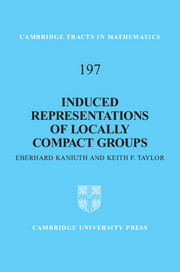3 - The imprimitivity theorem
Published online by Cambridge University Press: 05 December 2012
Summary
The inducing construction in Chapter 2 gives one the power to create unitary representations of a group G when representations of a closed subgroup H are given. One can also find conditions under which the induced representation is irreducible. However, a key question is often the converse: Is every irreducible representation of G equivalent to one induced from a proper subgroup? The imprimitivity theorem presented in this chapter is an invaluable tool in answering this question for many groups.
The full definition and some basic properties of systems of imprimitivity are introduced in Section 3.1. An induced representation is part of what is called, in Section 3.2, an induced system of imprimitivity.
In Section 3.2, we show that if two representations are induced from some subgroup, then the intertwining space of these representations can be identified with the intertwining space for the corresponding systems of imprimitivity. In Section 3.3, we state the imprimitivity theorem and provide a proof in the special case when the system of imprimitivity is living over a discrete coset space (that is, the corresponding subgroup is open). This prepares the way to understanding the general proof, which is presented in Section 3.4.
- Type
- Chapter
- Information
- Induced Representations of Locally Compact Groups , pp. 114 - 139Publisher: Cambridge University PressPrint publication year: 2012



